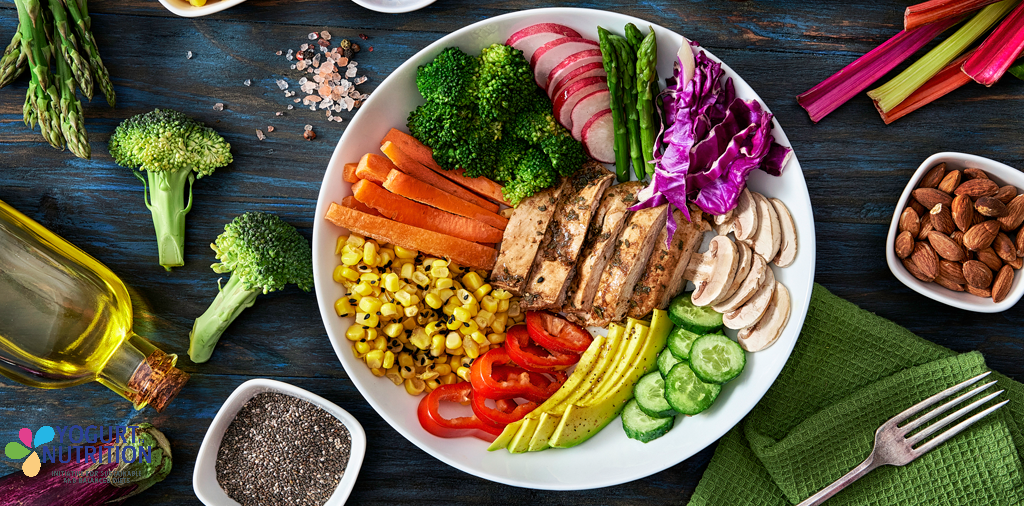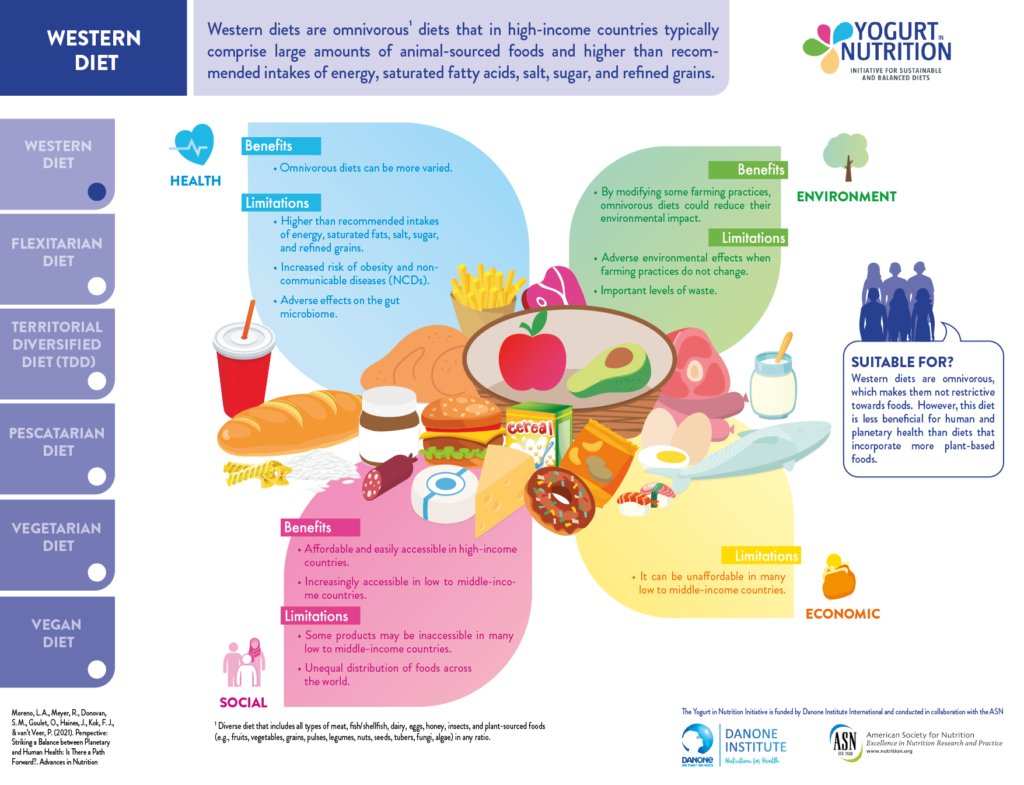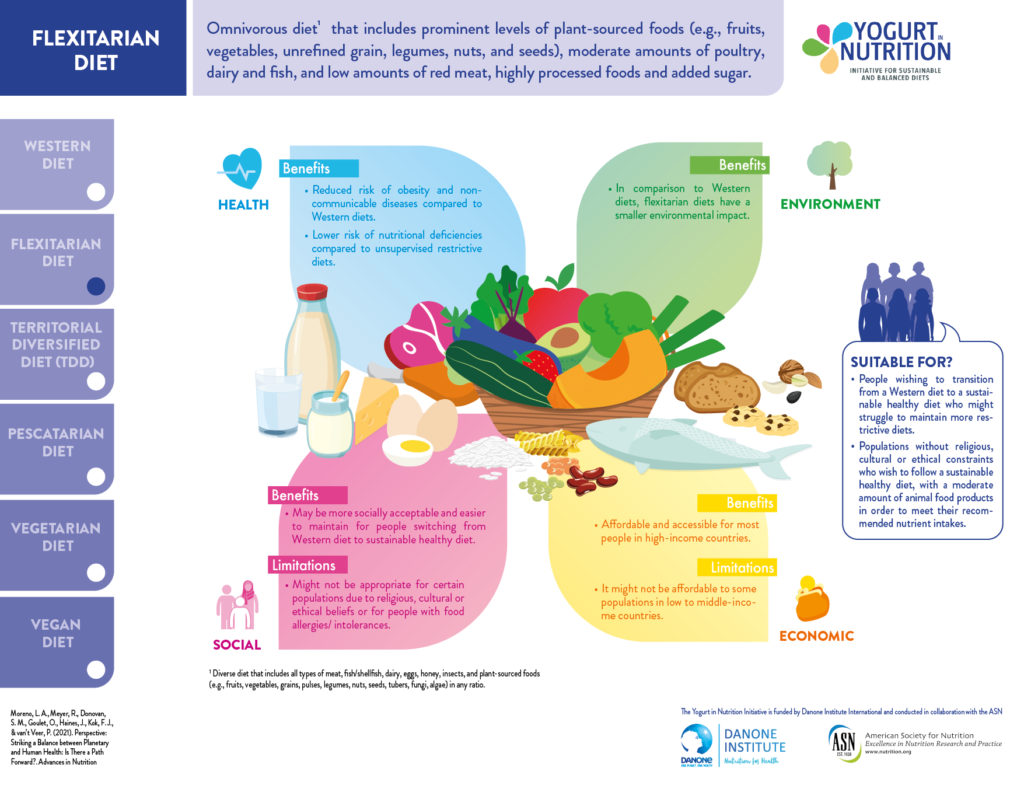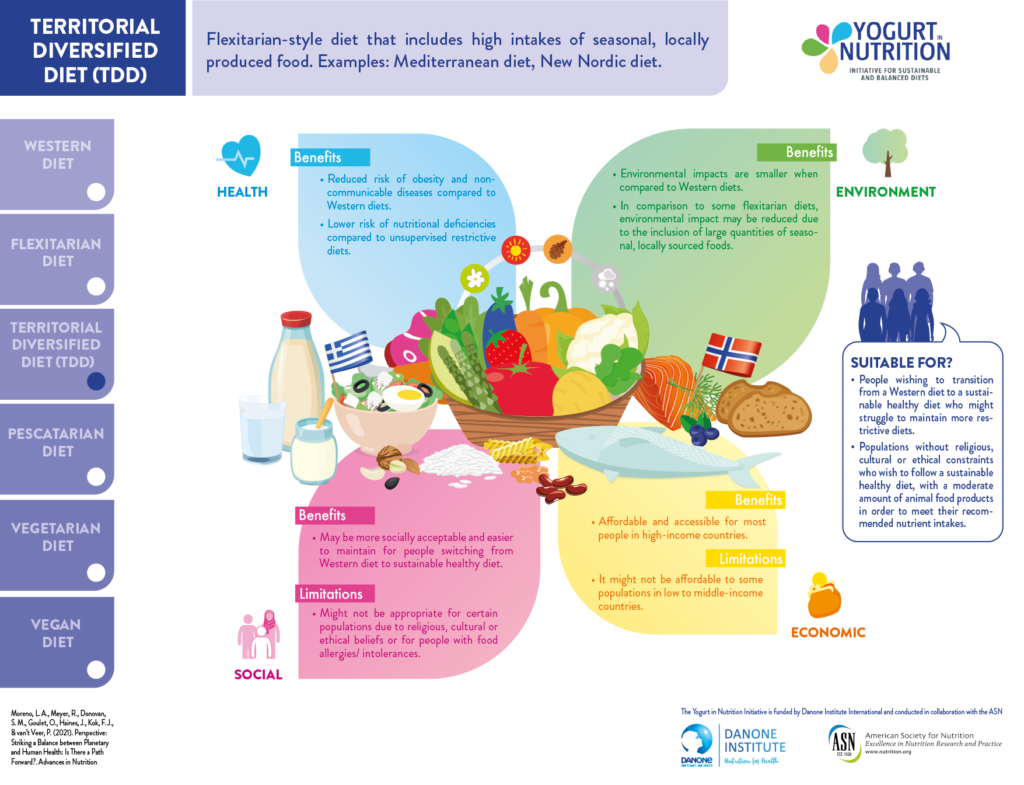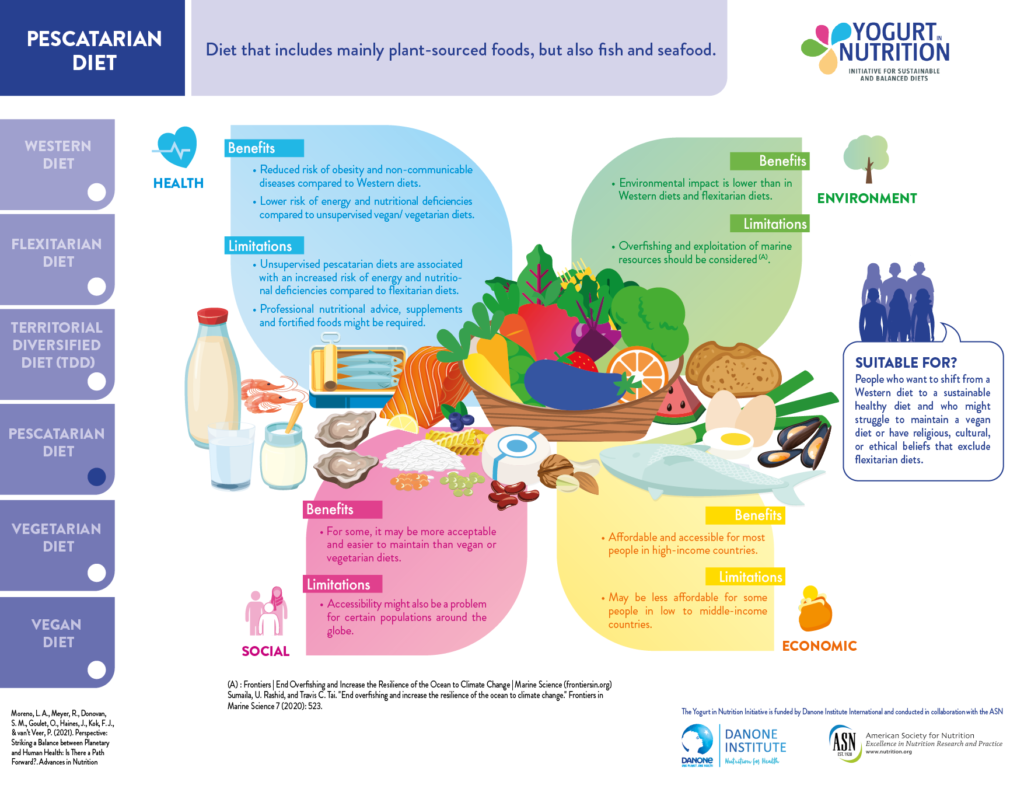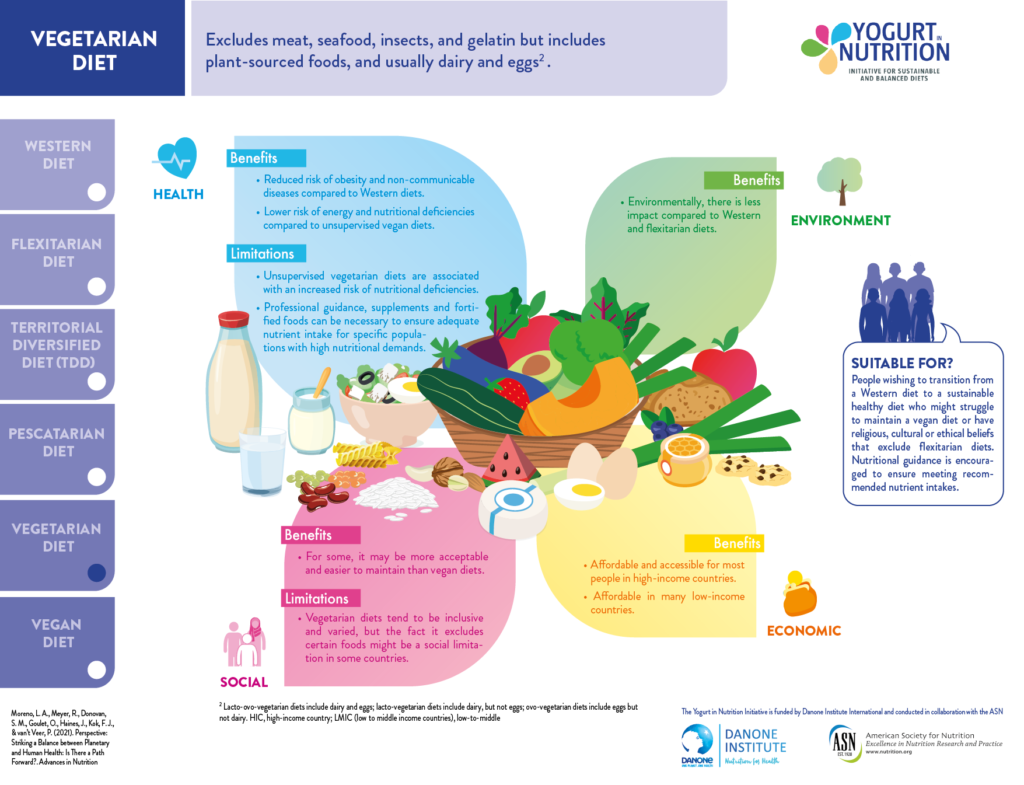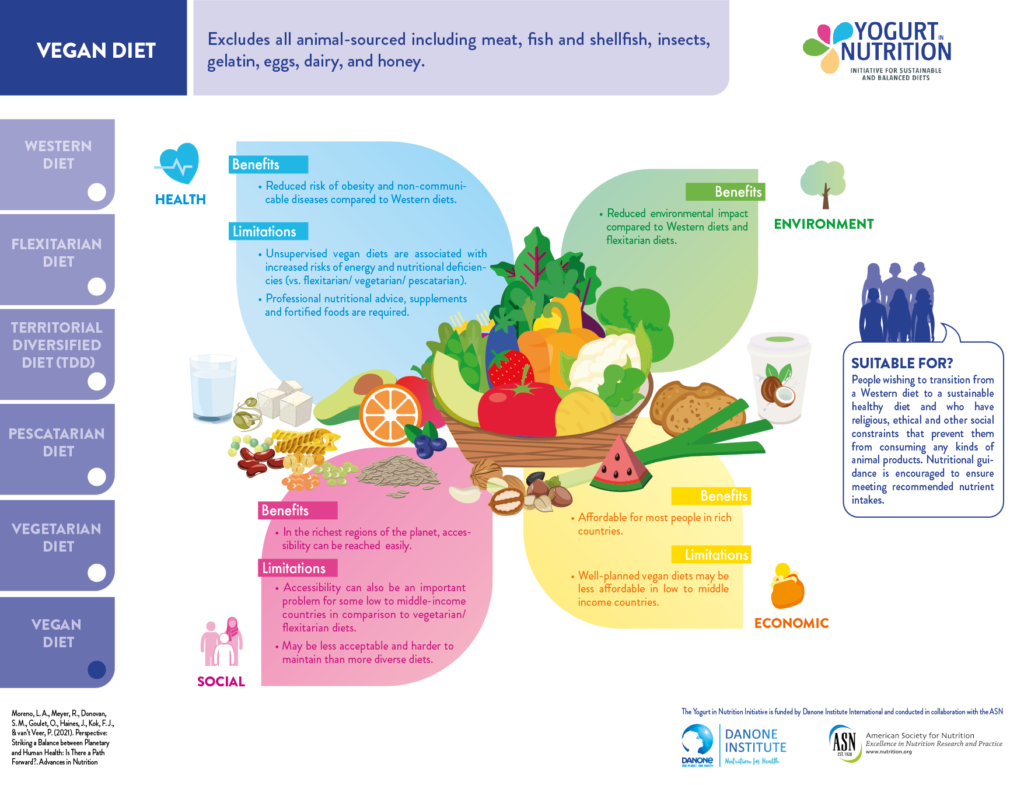What we eat has a major impact on our health and the health of our planet. In order to qualify as sustainable and healthy, a diet must meet several criteria of health, economic, environment and social issues (1). With these elements in mind, let’s take a leap from theory to real life and take a closer look at the most common different diets: what are, for each of them, the benefits and limits in terms of health, social, economic and environment?
Discover, through this infographic, a detailed review of 6 common diets and their impacts on human and planetary health(3).
The Western Diet
The Western Diet is an omnivorous diet that includes all types of meat, fish/shellfish, dairy, eggs, honey, insects, and plant-sourced foods (e.g., fruits, vegetables, grains, pulses, legumes, nuts, seeds, tubers, fungi, algae) in any ratio. The Western diet is however characterized by high intakes of animal-sourced and processed foods and lower-than-recommended intakes of plant-sources foods (3). It is recommended to shift from this type of diet to more sustainable healthy diets, incorporating more plant-based foods.
The Flexitarian Diet
The Flexitarian diet is an omnivorous diet that includes primarily plant-sourced foods (e.g., fruits, vegetables, unrefined grain, legumes, nuts, and seeds), moderate amounts of poultry, dairy and fish, and low amounts of red meat, highly processed foods and added sugar. The Flexitarian diet is ideal for people wishing to transition from a Western-style diet to a more sustainable healthy diet ; or for population without religious, cultural or ethical constraints who wish to follow a sustainable healthy diet, with a moderate amount of animal food products in order to meet their recommended nutrient intakes.
The Territorial Diversified Diet (TDD)
A Territorial Diversified Diet (TDD) is a flexitarian-style diet that includes high intakes of seasonal, locally produced foods. Examples are the Mediterranean diet or the New Nordic diet.
Like the Flexitarian diet, the TDD is suitable for people wishing to transition from a Western-style diet to a more sustainable healthy diet, but who might struggle to maintain more restrictive diets, such as vegan, vegetarian and pescatarian diets. Also, these diets represent a more sustainable option, by focusing on regionally- or seasonally-available foods.
The Pescatarian Diet
A pescatarian diet is a vegetarian diet that excludes meat, insects, and gelatin, but includes plant-sourced foods, dairy and eggs, fish and shellfish. Pescatarian diets are good options for people who have constraints when it comes to following vegan, vegetarian and flexitarian diets, but also wish to switch to a healthier dietary pattern, for they are more inclusive towards different types of foods. They are rich in n-3 fatty acids and iron, especially essential for women of reproductive age. However, marine ecosystems are the same as others, meaning that fish stocks should be taken care of and overfishing needs to be controlled to maintain sustainability.
The Vegetarian Diet
Vegetarian diets are mainly plant-sourced foods, but depending on the type may include dairy and eggs. It excludes meat, seafood, insects, and gelatin. A Lacto-Ovo-Vegetarian diet includes dairy and eggs. Lacto-vegetarian diets include dairy products, but not eggs and Ovo-vegetarian diets include eggs, but not dairy.
Vegetarian diets can be adopted by people wishing to transition from a Western diet to a sustainable healthy diet; who might struggle to maintain a vegan diet or have religious, cultural or ethical beliefs that exclude flexitarian diets. Nutritional guidance is encouraged to ensure meeting recommended nutrient intakes.
The Vegan Diet
The vegan diet excludes all animal products, including meat, fish and shellfish, insects, gelatin, eggs, dairy, and honey. It can be suitable for people switching for a sustainable healthy diet and who have religious, ethical and social constraints that prevent them from consuming any kinds of animal products. Nutritional guidance is encouraged to ensure meeting recommended nutrient intakes.
The “historical” Western-style diet has been implicated in increased risks of obesity and non-communicable diseases and recent recommendations (1,2) favor adoption of diets richer in plant-based foods (Flexitarian, TDD or plant-based diets). On the other hand, traditional plant-based diets (vegan/vegetarian/pescatarian diets) are consumed by large numbers of people who wish to reduce their intake of animal-sourced foods. Compared with western diets, those diets can reduce the risk of obesity, NCDs and premature mortality while reducing the impact of food production on the environment. However, plant-based diets, particularly vegan diets, can increase the risk of nutritional deficiencies.
The need to move towards sustainable diets for the health of the planet is clear, but adoption of more sustainable, healthy diet must balance the individual’s personal feelings, tastes, economic and social constraints. Fortunately, there are many options for individuals and families to choose from.

